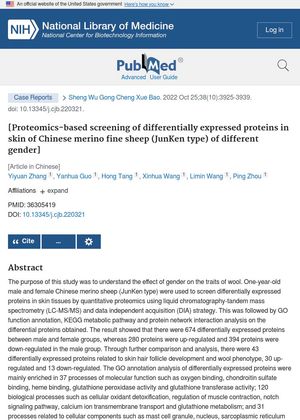Proteomics-Based Screening of Differentially Expressed Proteins in Skin of Chinese Merino Fine Sheep (JunKen Type) by Gender
October 2022
in “
PubMed
”
proteomics differentially expressed proteins skin tissues liquid chromatography-tandem mass spectrometry LC-MS/MS data independent acquisition DIA hair follicle development Gene Ontology GO annotation Kyoto Encyclopedia of Genes and Genomes KEGG pathway MAPK signaling pathway p53 signaling pathway COL1A1

TLDR Gender affects wool traits in sheep, with males and females showing differences in skin proteins related to wool growth.
This study aimed to investigate the impact of gender on wool traits in one-year-old male and female Chinese merino sheep (JunKen type) by identifying differentially expressed proteins in their skin tissues. Using liquid chromatography-tandem mass spectrometry (LC-MS/MS) and data independent acquisition (DIA), researchers found 674 differentially expressed proteins, with 280 up-regulated and 394 down-regulated in males. Of these, 43 proteins were related to skin hair follicle development and wool phenotype. Gene Ontology (GO) annotation and Kyoto Encyclopedia of Genes and Genomes (KEGG) pathway analyses revealed that these proteins were involved in various molecular functions, biological processes, and cellular components, with the MAPK and p53 signaling pathways being particularly relevant to wool growth. Protein network interaction analysis highlighted COL1A1 as a potential key player in wool development. The study provides foundational data for understanding the molecular mechanisms behind wool traits in sheep of different genders.

